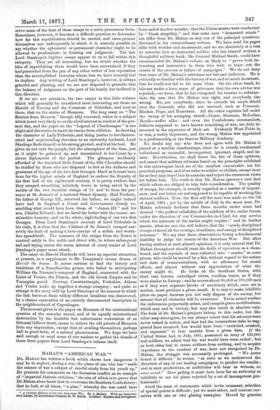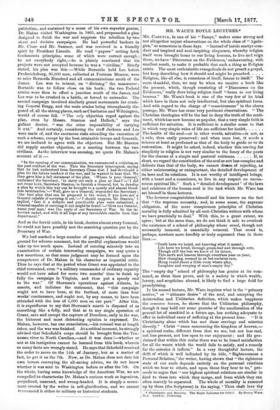MAHAN'S "AMERICAN WAR."*
DB. MAHAN has written a book which shows how dangerous it may be to neglect, during a war, the plans of one who has "made the science of war a subject of careful study from his youth up." He presents his comments on the Secession conflict as an example of "impartial historic criticism," the aim of which is to prove that Dr. Mahan alone knew how to overcome the Southern Confederacy; that he had, at all times, "a plan," whereby the war could have * 4 Critical History of the late American War. By A. Mahan. With an Introduc- tory Latter, by Lieutenant-General MW. Smith. London: Hodder and Stoughton. been ended in a few months ; that the Union armies were conducted by "blank stupidity," and that none save "demented minds" can differ from Dr. Mahan on any one of the principal questions discussed in his extraordinary volume. We have read his pages alike with wonder and amusement, and we are absolutely at a loss to conceive how an instructed soldier, who has himself written a thoughtful military book, like General Michael Smith, could have recommended Dr. Mahan's volume as likely to "prove both in- teresting and instructive to those who wish to trace out the causes of the success or failure of campaigns." We do not deny that some of Dr. Mahan's criticisms are fair and judicious. He is evidently so familiar with the history of war, and so much in earnest, that he could not fail to hit some blots. On the other hand, he labours under a keen sense of grievance that his own advice was rejected,—so keen, that he has composed his treatise to substan- tiate the case that Dr. Mahan was right, and everybody else wrong. No, not everybody, since he extends his ample shield over the Generals who did not succeed, such as Fremont, Hooker, Pope, and Rosecrans. All the other captains fall under the sweep of his avenging sword—Grant, Sherman, McLellan, Meade—suffer alike ; and even the Confederate commanders, hitherto supposed to have known something of war, are duly in- structed in the mysteries of their art. Evidently West Point is, or was, a costly imposture, and the wrong Mahan was appointed to a professorship at the famous Military Academy.
No doubt any one who does not agree with Dr. Mahan is placed at a terrible disadvantage, since he is utterly condemned beforehand as uncandid, incompetent, ignorant, stupid, and in- sane. Nevertheless, we shall brave the fire of these epithets, and assert that military criticism based on the principles exhibited in this extravagant book are of the smallest conceivable use for practical purposes, and of no value to soldier or civilian, except in so far as they may impel him to examine and reject the erroneous views set before him. The truth is that Dr. Mahan ignores a vast deal which others are obliged to take into consideration. The quality of troops, for example, is usually regarded as a matter of import- ance, and raw levies are not supposed to be capable of working like trained soldiers. Now, the first call for men was made on the 7th of April, 1861; yet by the middle of July in the same year, Dr. Mahan solemnly declares that three months under arms had showed "the perfect reliability of the soldiery of the entire forces, under the direction of our Commander-in-Chief, for any service which the interests of the nation might require ;" and he further asserts, what no one else will believe, that the "newly-disciplined troops evinced all the courage, steadiness, and energy of disciplined veterans." We say that these observations betray a fundamental inability to judge the events of the American War. But after having arrived at such absurd opinions, it is only natural that Dr. Mahan throughout should treat the fields of operation as a chess- board, and the myriads of men collected into " armies " as mere pieces, who could be moved by a fiat, without regard to the nature and state of communications, with no allowance for moral effects, and almost without any appreciation of what the enemy might do. He looks on the Southern States, with their vast forests, unblidged rivers, roadless tracts, as if they were similar to Europe ; and he moves about 80,000 or 100,000 men as if they were separate blocks of machinery which, once set in motion, must produce a given result. It is easy to make infallible plans on paper, because you not only dispose of the enemy, but assume that all obstacles will be overcome. Yet in actual warfare the unforeseen perpetually arises, and compels grave modifications, which may end in victory, but may also result in absolute ruin. The bulk of Dr. Mahan's projects belong to this order, but like other map-strategists, he can always retort that his schemes were never tested in action, and that had the tremendous risks he sug- gested been incurred, Lee would have been "encircled, crushed, and captured" in four months from a given date. If the United States had, in July, 1861, possessed an army of 150,000 real soldiers, we admit that the war would have soon ended ; but as both aides had to create soldiers from nothing, and to acquire experience in the conduct of war, facts not recognised by Dr. Mahan, the struggle was necessarily prolonged. "We never found it difficult," he writes, "as Boon as we understood the direction of any of our leading campaigns, to predict the results ; and in such predictions, as multitudes will bear us witness, we never erred." How galling it must have been for an authority so infallible to see his plans rejected by a set of incompetent pro- fessionals!
Amid the mass of statements which invite comment, selection of special points is difficult ; yet we must select, and content our- selves with one or two glaring examples. Moved by genuine
patriotism, and sustained by a sense of his own superior genius, Dr. Mahan visited Washington in 1863, and propounded a plan designed to finish the war and suppress the rebellion by two short and decisive campaigns. He had powerful backers in Mr. Chase and Mr. Sumner, and was received in a friendly spirit by President Lincoln. He read " papers " setting forth fundaments principles, some of which were correct enough ; he set everybody right,—he is plainly convinced that his projects were not accepted because he was a "civilian." Briefly stated, his plan was this :—While Burnside held Lee before Fredericksburg, 80,000 men, collected at Fortress Monroe, were to seize Bermuda Hundred and all communications south of the James. Lee was to retreat, on "divining" the manceuvre ; Burnside was to follow close on his heels ; the two Federal armies were then to effect a junction south of the James, and Lee was to be crushed in a battle, or forced to surrender. The second campaign involved similarly grand movements for crush- ing General Bragg, and the main armies being triumphantly dis- posed of, all the strong places, such as Charleston and Wilmington, would of course fall. "The only objection urged against the plan, even by Messrs. Stanton and Halleck," says the gallant doctor, "was the utter impossibility of carrying It out" And certainly, considering the stuff Jackson and Lee were made of, and the enormous risks attending the execution of such a scheme, except by the best attainable troops and Generals, we are inclined to agree with the objectors. But Mr. Stanton did supply another objection, at a meeting between the two
civilians. As the interview was amusing, we quote Dr. Mahan's account of it :—
" In the opening of our communication, we commenced a criticism on the past conduct of the war. This the Secretary interrupted, saying that he had understood from Secretary Chase that I had developed a plan for the future conduct of the war, and he wanted to hear that We then gave him a full statement of the plan. Where is your General,' exclaimed the Secretary, to carry out such a plan as that ?'—' I did not come here, Secretary Stanton, to furnish a General, but to develop a plan by which this war can be brought to a speedy and almost blood- less termination.'—' Well, give us a General,' responded the Secretary ; the best plan that can be proposed is the worst, if you have not a General capable of carrying it out'—' I should suppose, Mr. Stanton,' I replied, that if a definite and practicable plan were submitted, a General capable of carrying it out might be found.'—' Give us a General, name your man,' was the reply of our Secretary of War. So the in-
terview ended, and with it all hope of any favourable results from that department."
And as the fervid critic, in his book, decries almost every General, he could not have possibly met the searching question put by the Secretary of War.
We had marked a large number of passages which offered fair ground for adverse comment, but the needful explanations would take up too much space. Instead of entering minutely into an examination of certain interesting campaigns, we may quote a few assertions, so that some judgment may be formed upon the competence of Dr. Mahan in his character as impartial critic. Thus he says that at the period when Grant was appointed to the chief command, even "a military commander of ordinary capacity would not have asked for more two months' time to finish up fully the campaign in Virginia, and thus put a speedy end to the war." Of Sherman's operations against Atlanta, he asserts, and italicises the statement, that "this campaign ought not to have been, at the furthest, of more than four weeks' continuance, and ought not, by any means, to have been attended with the loss of 5,000 men on our part." After this, it is superfluous to say that Sherman's march is disposed of as something like a folly, and that as to any single operation of G-rant, save and except the capture of Donelson, early in the war, the bitterest and most detracting opinion is expressed. Dr. Mahan, however, has one consolation,—his counsel was at length taken, and the war was finished. At a critical moment, he strongly advised that Schofield's corps should be brought from the Ten- nessee river to North Carolina,—and it was done !—whether or not at his instigation cannot be learned from this book, wherein so many facts are wrongly stated. He says that Schofield received the order to move on the 14th of January, but as a matter of fact, he got it on the 7th. Now, as Dr. Mahan does not date his own letters conveying the all-saving advice, we do not know whether it was sent to Washington before or after the 7th. On the whole, having some knowledge of the American War, we are compelled to characterise Dr. Mahan's curious work as ingenious, prejudiced, unsound, and wrong-headed. It is simply a monu- ment erected by the writer in self-glorification, and we cannot recommend it either to military or historical students.



































 Previous page
Previous page